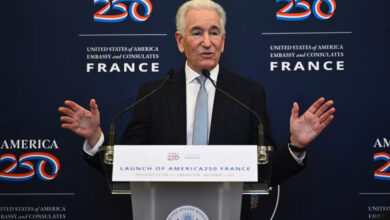As the government points the finger at “foreign hands” behind the recent Alexandria church bombing, the world is looking at Egypt, which has long been accused–both domestically and abroad–of neglecting the rights of its most prominent minority.
Copts in Egypt have long been perceived as the victims of bureaucratic and social discrimination. While world leaders have spoken on the issue before, the New Year’s Eve church bombing has forced them to take the situation more seriously.
The world acted quickly to condemn the attack–which killed 23 Coptic Christians–with prominent leaders sending their condolences to President Hosni Mubarak and the Egyptian people.
The incident has brought the issue of terrorism and Islamic fundamentalism back to the fore. Much of the world’s attention has been on the perceived plight of Christians in Egypt and the Middle East, prompting international calls to ensure both their rights and security.
“Since 9/11, the world has taken a closer look at the plight of minorities in tyrannical nations,” Yousef Sidhom, editor-in-chief of Coptic weekly Al-Watan, said. “After any tragic event, there is usually a heightened interest in the plight of Christians. It happened with last year’s Naga Hammadi incident, and it’s happening now.”
Following the attack, French President Nicolas Sarkozy asserted that Christians in the Middle East were being “targeted for religious cleansing.” In a statement to Al-Masry Al-Youm from the French embassy in Egypt, French Minister of Foreign and European Affairs Michele Alliot-Marie said: “On Eastern Christians, it’s time to move beyond emotion and specific actions to develop a real strategy and global responses.”
EU foreign ministers also collectively called for the protection of Christians worldwide in a letter sent to EU foreign policy chief Catherine Ashton. The letter–penned by Italian FM Franco Frattini and cosigned by his French and Hungarian counterparts–called for “concrete steps” to be taken to counter the persecution of Christians around the world. The issue is expected to come up for discussion at a scheduled meeting of EU foreign ministers on 31 January.
A result perhaps of what is described as the “historical link” between France and the region’s Christians, Alliot-Marie believes France will play a leading role in the issue. “Europeans should jointly explore how to contribute concretely with the states concerned to the safety of Christians in the countries in which they live,” she said.
But many are skeptical of the ability–or desire–of the US or EU to adopt measures aimed at forcing the Egyptian government to respond to their criticisms.
“It is a foregone conclusion that the US and EU deal with Egypt purely on the basis of their strategic relationship,” Sidhom said. “We have learned to never expect foreign help in this regard. Change must happen internally.”
Washington, for its part, has been relatively quiet on the issue, with US President Barack Obama offering condolences, condemnation, and assistance–but not much else.
Rome’s Pope Benedict reportedly praised the European call to protect the Middle East’s Christians, noting "the urgent need for the governments of the region to adopt–in spite of the difficulties and dangers–effective measures for the protection of religious minorities.” Immediately after Benedict’s statements, Egypt withdrew its ambassador to the Vatican and publicly condemned the pontiff’s statements, describing them as “unacceptable interference in the country’s internal affairs.”
According to Fredrico Lombardi, director of the Holy See’s press office, there is a level of social discrimination in Egypt that manifests itself in several ways. These, he said, include “difficulties obtaining important positions in universities or in the civil service, which apply to all Christians and not just Coptic Christians.” Lombardi also pointed to the difficulties associated with church building in Egypt, noting the inadequacy of the current number of available churches for the country’s large Christian community.
While insisting the Vatican would not push the issue on a political level, Lombardi made it clear that international advocacy on the part of the Vatican would continue.
“Rather than talking about political pressure, the Holy See seeks to remind all people of good will of the fundamental principles necessary for the common good,” he told Al-Masry Al-Youm. “The Holy Father…has asked all governments to give due protection to all their citizens, and in particular to those who do not belong to the religion of the majority.”
Alliot-Marie and Lombardi both noted that the Egyptian constitution guaranteed equality between all citizens, asserting that the main culprits in the Coptic issue were terrorism and social discrimination. But they also affirmed the need to advocate for stepped-up protection for Egypt’s Copts, along with the need to ensure Christians’ ability to build places of worship.
The Coptic community, meanwhile, has vented a great deal of anger towards the government following the Alexandria bombing and the Omraniya Church riots in early November, in which the issue of church building was a central factor.
The Egyptian government has never taken kindly to perceived foreign interference, and has historically cracked down on local entities that have sought foreign assistance. Coptic authorities, however, insist they are not looking for foreign help in resolving their longstanding grievances.
“We never asked for foreign help,” said Sidhom. “The world is not reacting specifically to threats against Copts or Christians, but rather to threats against all persecuted minorities. They intervened before to protect Chechens, Kosovars and Kurds–this is just a continuation of the trend.”
Rights watchdogs have longed claimed that Christians are subject to a degree of religious intolerance in Egypt, and have long advocated for their cause. Groups such as the UK Copts Association and the Coptic Assembly of America, meanwhile, have also pushed the issue globally.
Previous attacks–albeit smaller ones–such as the Naga Hammadi shooting, have historically incurred global responses that are seldom translated into concrete action by the international community. The Alexandria bombing has elicited the strongest reaction from the western world–at least the EU–to date.
Only time will tell if these reactions will have tangible effects–or if they will simply represent just another opportunity to criticize a regime that the West continues to support both financially and diplomatically.




